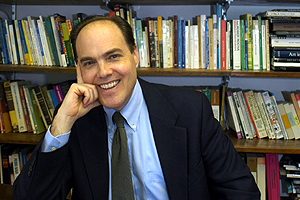
Stanford University, PhD '86
Prof. Borges has retired and no longer directs BA theses or accepts new graduate students.
BIOGRAPHY
Dain Borges works on nineteenth- and twentieth-century Latin American culture and ideas. His current research project, "Races, Crowds, and Souls in Brazilian Social Thought, 1880–1920," centers on the ways in which Brazilian intellectuals used race sociology and social psychology to understand popular religion and politics. He teaches seminars and courses on Latin American history, comparative nineteenth-century transformations, ideologies of national identity, and culture in the African diaspora.
Recent Research / Recent Publications
-
“Mockery and Piety in Eça de Queirós and Machado de Assis.” Revista de Estudos Literários [Coimbra] (2016).
-
“Catholic Vanguards in Brazil.” In Local Church, Global Church: Catholic Activism in Latin America from Rerum Novarum to Vatican II, edited by Stephen J. C. Andes and Julia G. Young. Washington, DC: Catholic University of America Press, 2015.
-
"Healing and Mischief: Witchcraft in Brazilian Law and Literature, 1890–1922." In Crime and Punishment in Latin America, edited by Carlos Aguirre, Gilbert Joseph, and Ricardo Salvatore. Durham, NC: Duke University Press, 2001.
-
Esau and Jacob, by Machado de Assis. New York: Oxford University Press, 2000 (editor).
-
"A Mirror of Progress." In The Brazil Reader: History, Culture, Politics, edited by Robert M. Levine and John J. Crocitti. Durham, NC: Duke University Press, 1999.
-
"Intellectuals and the Forgetting of Slavery in Brazil." Annals of Scholarship 11 (1996).
-
"The Recognition of Afro-Brazilian Symbols and Ideas, 1890–1940." Luso-Brazilian Review 32 (1995).
-
"Puffy, Ugly, Slothful, and Inert: Degeneration in Brazilian Social Thought, 1880–1940." Journal of Latin American Studies 25 (1993).
-
The Family in Bahia, Brazil, 1870–1945. Stanford: Stanford University Press, 1992.
-
Discusses "Natural Disasters and Social Responses" at the Summer Teacher Institute, University of Chicago [video, 50 mins]
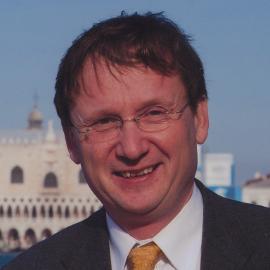
University of Cambridge, PhD '92
BIOGRAPHY
Adrian Johns is the author of The Science of Reading: Information, Media, and Mind in Modern America (Chicago, 2023), Death of a Pirate: British Radio and the Making of the Information Age (Norton, 2010), Piracy: The Intellectual Property Wars from Gutenberg to Gates (Chicago, 2009), and The Nature of the Book: Print and Knowledge in the Making (Chicago, 1998), and co-editor (with James Evans) of Beyond Craft and Code: Human and Algorithmic Cultures, Past and Present (Osiris 38, 2023, forthcoming). He has also authored dozens of papers in the histories of science, the book, media, and information. The Nature of the Book won the Leo Gershoy Award of the American Historical Association, the John Ben Snow Prize of the North American Conference on British Studies, the Louis Gottschalk Prize of the American Society for Eighteenth-Century Studies, and the SHARP Prize for the best work on the history of authorship, reading, and publishing. Piracy won the Laing Prize and was selected as Book of the Year by the American Society for Information Science and Technology. Johns has been awarded Guggenheim, ACLS, NEH, and NSF fellowships. Educated in Britain at the University of Cambridge, he has also taught at the University of Kent at Canterbury, the University of California, San Diego, and the California Institute of Technology.
Recent Research / Recent Publications
The Science of Reading: Information, Media, and Mind in Modern America (Chicago: University of Chicago Press, 2023).
Beyond Craft and Code: Human and Algorithmic Cultures, Past and Present (Osiris 38, 2023). (Co-edited with James Evans.)
Presentation on "The Science of Reading and the Making of the Information Society," UIUC, March 2024 (video).
Presentation on “After Hours: Historia Coelestis,” Linda Hall Library, November 2022 (video).
Publication of “Piracy in the Book Trade” [essay review of Robert Darnton, Piracy and Publishing], American Historical Review 127:3 (September 2022), 1433–1435.
“Watching Readers Reading.” Textual Practice 35:9 (October 2021), 1429-52.
“Privacy.” In A. Blair, P. Duguid, A.-S. Goering, and A. Grafton (eds.), Information: A Historical Companion(Princeton: Princeton University Press, 2021), 686-93.
“The New Rules of Knowledge” (with James Evans). An introduction to a tryptich of papers on algorithmic epistemology. Critical Inquiry 46:4 (Summer 2020), 806-12.
“Lay Assaying and the Scientific Citizen.” Proceedings of the American Philosophical Society 160, no. 1 (Mar. 2016): 18–25.
”The Coming of Print to Europe.” In The Cambridge Companion to the History of the Book, edited by L. Howsam, 107–24. Cambridge: Cambridge University Press, 2015.
“Intellectual Property.” In Globalization in Practice, edited by N. Thrift, A. Tickell, S. Woolgar, and W. H. Rupp, 183–88. Oxford: Oxford University Press, 2014.
“The Uses of Print in the History of Science.” Papers of the Bibliographical Society of America 107, no. 4 (Dec. 2013): 393–420.
“The Ecological Origins of Copyright Skepticism.” World Intellectual Property Organization Journal 5, no. 1 (2013): 54–64.
“The Information Defense Industry and the Culture of Networks.” Amodern 2: Network Archaeology (2013).
Death of a Pirate: British Radio and the Making of the Information Age. New York: W.W. Norton, 2010.
Piracy: The Intellectual Property Wars from Gutenberg to Gates. Chicago: University of Chicago Press, 2009.
- Gordon J. Laing Award, University of Chicago Press
- Book of the Year Award, American Society for Information Science and Technology
- Outstanding Academic Title Awards, Choice Magazine
The Nature of the Book: Print and Knowledge in the Making. Chicago: University of Chicago Press, 1998.

Harvard University, PhD '09
BIOGRAPHY
My research on intellectual history, or the history of ideas, is my way of exploring how history and thought shape each other over time. The Italian Renaissance is a perfect moment for approaching this question because at that point the ideas about science, religion, and the world that had developed in the Middle Ages suddenly met those of the ancient world, reconstructed from rediscovered sources. All at once many beliefs, scientific systems, and perceived worlds clashed, mixed, and produced an unprecedented range of new ideas, which in turn shaped the following centuries and, thereby, our current world.
My current research focuses on patterns in the history of the real motives of censors over space and time, from antiquity to the digital age, especially the Inquisition and early modern censorship, and 20th century censorship of popular media. The enormous impact of Orwell's Nineteen Eighty-Four has led modern people to imagine censorship working the way his Ministry of Truth does: imposed top-down on a populace, with vast resources, a stable, long-term plan, and the goal of controlling society, stifling thought, and destroying information. But the real actions and records of past censors reveal that the vast majority of real censorship has inverse qualities: shaped by bottom-up social anxiety, constantly desperate for funds and personnel, hastily improvised in response to a perceived crisis, constantly transformed ad hoc as the perceived threat changes, and (from the point of view of the censors) aiming to protect vulnerable individuals, and to encourage self-censorship rather than destroying extant information. Only by examining the real motives which have made people say "Yes" to censorship over space and time can we understand what patterns help it flourish, and ways to combat it. I am especially interested in how innovations in information technology trigger waves of new censorship, a topic I explored in a dialog series and museum exhibit: voices.uchicago.edu/censorship.
As a novelist (science fiction, fantasy, and historical fiction), I am also very interested in how to better connect the worlds of history research and speculative fiction, both to innovate pedagogically, and to help new improved historical narratives and correctives make it into the books, games, and TV which are what shape most people's first impressions of history, but often draw on histories that are more than half a century out of date. I have a forthcoming collection of essays on history and genre fiction, Diaspora of Time: Conversations on Science Fiction and Fantasy coming from Tor Books, several publications on history in SF&F, comics, anime & manga, and am a nonfiction columnist for Strange Horizons. I also employ creative writing, role-playing and LARP in my classes, and work with SFWA (the Science Fiction Writers of America) on helping to connect writers with historians and their research. I also have a forthcoming popular press book, Why Renaissance? Invention of a Golden Age, which aims to present to a general audience how and why the ideas of a golden Renaissance and bad Middle Ages were invented, and how historians are still working to improve and update them, and to update popular conceptions of Renaissance humanism.
My first scholarly book, Reading Lucretius in the Renaissance, explores scholars' use of Lucretius's Epicurean didactic poem De Rerum Natura from its rediscovery in 1417 to 1600, focusing on the challenges its atomistic physics posed to Christian patterns of thought. In a period when atheism was often considered a sign of madness, the sudden availability of a sophisticated system that explained natural phenomena in nontheistic ways and that argued powerfully against the immortality of the soul, the afterlife, and a creator God threatened to supply the one weapon unbelief had lacked in the Middle Ages: good answers. At the same time, humanist scholars who idealized ancient Rome were eager to study a poem whose language and structure so often anticipated their beloved Aeneid. My book uncovers humanist methods for reconciling Christian and pagan philosophy and shows how atomism and ideas of emergent order and natural selection, so critical to our current thinking, became situated in Europe's intellectual landscape at the beginning of the scientific transformations of the seventeenth century. In it I employ a new quantitative method for analyzing marginalia in manuscripts and printed books, whose results expose how changes in scholarly reading practices over the course of the sixteenth century, fostered by the growth of printing, controlled the circulation of texts and gradually expanded Europe's receptivity to radical science, setting the stage for the scientific revolution.
I also work extensively on classical transformations, i.e., how, thanks to humanist enthusiasm for reconstructing the golden age of ancient Greece and Rome, material received from the classical and medieval worlds was transformed in Renaissance hands and in turn transformed the Renaissance world. I am working on a long-term project on the imagined antiquity believed in by Renaissance humanists, and how their efforts to reconstruct the ancient world aimed, not at the ancient world as we now understand it, but at a very different ancient world whose character can be reconstructed from Renaissance paratexts, imitations, paintings, period translations, biographies of ancients, forgeries, and spuria which we often dismiss today as simple errors. Along with the Classical Transformations Group at Texas A&M University and the Transformationen der Antike group at the Humboldt-Universität zu Berlin, I am working to change the way we think about reception studies, and bring greater attention to how each period transforms and is transformed by the materials it inherits from earlier eras.
Much of my research has been conducted in rare books libraries, especially in Rome and Florence, where I worked with Renaissance copies of classical texts, both manuscripts and printed books. I have been a Fulbright scholar in Italy and a graduate reader and later a fellow at the Villa I Tatti Harvard University Center for Italian Renaissance Studies. I completed my PhD and graduate teaching at Harvard University, and taught at Texas A&M University before coming to the University of Chicago. My article "Reading Lucretius in the Renaissance" (Journal of the History of Ideas, 73:3, [July 2012]: 395–416) won the 2013 I Tatti Prize for Best Article by a Junior Scholar, and the prize for the best article in the JHI.
All my projects stem from my overall interest in the relationship between ideas and historical change. Our fundamental convictions about what is true evolve over time, so different human peoples have, from their own perspectives, lived in radically different worlds. The universe which Thomas Aquinas thought he occupied was not the universe in which Plato or Machiavelli or Freud believed they lived, and such beliefs in turn shaped the futures they tried to build out of what they inherited from the past. Our own current efforts to build the future are likewise predicated on what we believe is true, but what we believe is not what any past culture has believed, nor what any future cultures will believe.
Recent Research / Recent Publications
- Inventing the Renaissance: The Myth of a Golden Age. Chicago, IL: The University of Chicago Press, 2025.
- Reading Lucretius in the Renaissance. Cambridge, MA: Harvard University Press, I Tatti Renaissance Studies Series, 2014.
- Coauthored with James Hankins. The Recovery of Classical Philosophy in the Renaissance, a Brief Guide. Florence: Istituto Nazionale di Studi sul Rinascimento, 2007.
- “The Persecution of Renaissance Lucretius Readers Revisited,” in Philip Hardie, Valentina Prosperi, and Diego Zucca eds., Lucretius Poet and Philosopher: Background and Fortunes of ‘De Rerum Natura’, De Gruyter, 2020.
- “Humanist Dissemination of Epicureanism,” in The Oxford Handbook of Epicureanism, ed. Phillip Mitsis. Oxford: Oxford University Press, 2020.
- “The Effects of Authorial Strategies for Transforming Antiquity on the Place of the Renaissance in the Current Philosophical Canon,” in Beyond Reception: Renaissance Humanism and the Transformation of Classical Antiquity, eds. Patrick Baker, Johannes Helmrath, and Craig Kallendorf, 2019.
- “Humanist Lives of Classical Philosophers and the Idea of Renaissance Secularization: Virtue, Rhetoric, and the Orthodox Sources of Unbelief.” Renaissance Quarterly, 70, 3 (2017), 935-76.
- “On Progress and Historical Change,” KNOW: A Journal on the Formation of Knowledge, Fall 2017, pp. 319-337.
- “The Active and Monastic Life in Humanist Biographies of Pythagoras,” Forms and Transfers of Pythagorean Knowledge: Askesis—Religion—Science, eds. Almut-Barbara Renger & Alessandro Stavru. Harrassowitz: Wiesbaden, 2016.
- “The Recovery of Stoicism in the Renaissance,” in The Routledge Handbook of the Stoic Tradition, ed. John Sellars. New York: Routledge, 2016, pp. 117-132.
- "T. Lucretius Carus, Addenda et Corrigenda." In Catalogus Translationum et Commentariorum: Mediaeval and Renaissance Latin Translations and Commentaries, vol. 10. Washington D.C.: Catholic University of America Press, 2014.
- "The Recovery of Stoicism in the Renaissance." In The Routledge Handbook to the Stoic Tradition, edited by John Sellars, forthcoming.
- "The Use and Defense of the Classical Canon in Pomponio Leto's Biography of Lucretius." In Vitae Pomponianae, Biografie di Autori Antichi nell’Umanesimo Romano (Lives of Classical Writers in Fifteenth-Century Roman Humanism), proceedings of a conference hosted by the Danish Academy in Rome and the American Academy in Rome, April 24, 2013, Renaessanceforum (Forum for Renaissance Studies, Universities of Aarhaus & Copenhagen), 2014.
- "Reading Lucretius in the Renaissance." The Journal of the History of Ideas 73, no. 3 (July 2012): 395–416.
- Terra Ignota (novel series, four volumes starting with volume 1 Too Like the Lightning), Tor Books 2016-21.
- “Writing/Realizing Disability + Power,” Strange Horizons, August 2022.
- “The Protagonist Problem,” with Jo Walton, Uncanny Magazine, 2021.
- “Censorship and Genre Fiction: Let’s Broaden our Broader Reality.” Uncanny Magazine, May 2020.
- "Ada Palmer and the Weird Hand of Progress” profile in Wired Magazine, 2022.
- "Why Trump's Decision to Intervene in Campus Speech Policies Is So Dangerous," op-ed, Washington Post, Mar. 28, 2019.
- "Why Is Silcon Valley So Obsessed with the Virtue of Suffer?" New York Times, Mar. 26, 2019.
- "How #Article13 Is Like the Inquisition: John Milton against the EU #CopyrightDirective," Boing Boing, Mar. 24, 2019
- Profile in the university's alumni magazine
- Reviews Enlightenment Now for Harvard Magazine
- Launches censorship research project with Adrian Johns
- Q&A with Chicago Magazine on third novel
- NPR reviews Too Like the Lightning
- Scientific American interview with Palmer about her novel
- Edits Volume of Student Essays as Part of Graduate Colloquium
- Publishes Reading Lucretius in the Renaissance (Harvard, 2014)
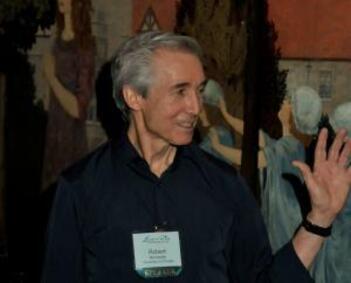
St. Louis University, PhD' 71
University of Chicago, PhD' 78
BIOGRAPHY
I do research on history and philosophy of biology and psychology, as well as on German Romanticism. This includes particular interest in evolutionary biopsychology, ethology, and sociobiology. Concerning philosophic and metahistoric problems, I have argued for a revaluation of evolutionary ethics and have developed a natural selection model for historiographic analysis. My first book treats evolutionary theories of mind and behavior. That history discusses the period from the late eighteenth century to the present, but particularly focuses on the work of Charles Darwin. Other figures that receive major attention are Herbert Spencer, George Romanes, Lloyd Morgan, William James, James Mark Baldwin, Konrad Lorenz, and Edward O. Wilson. In another book, I have traced the gradual alteration in meaning of the concept of “evolution” from the seventeenth century up to Darwin and contemporary neo-Darwinians. I argue that Darwin's own theory has a radically different character than usually thought. In another vein, I have written a history of German Romanticism during the period 1770-1830. I argue that the German Romantics held that aesthetic approaches to nature and scientific approaches were complementary, and that this conception had a powerful impact on both the art and biological science of the period. Among the figures considered are Novalis, the Schlegel brothers, Kant, Schelling, and Goethe. German evolutionary theory is the subject of my next book, with a special focus on Ernst Haeckel; he was supposed to have committed egregious fraud and produced theories that led to the rise of Nazi biology. I dispute both of these contentions. The connection between evolutionary theory and Hitler's biology is the subject of a book that examines controversies in the historiography of evolutionary biology. Recently, Michael Ruse and I have embarked on an historical and philosophical consideration of Darwin's accomplishment—we disagree profoundly. I teach courses on all of the above topics, as well as courses on the philosophy of history and ancient Greek philosophy and science.
Recent Research / Recent Publications
Co-authored with Michael Ruse. Debating Darwin. Chicago: University of Chicago Press, 2016.
Was Hitler a Darwinian? Disputed Questions in the History of Evolutionary Theory. Chicago: University of Chicago Press, 2013.
The Tragic Sense of Life: Ernst Haeckel and the Struggle over
Evolutionary Thought. Chicago: University of Chicago Press, 2008. Gordon J. Laing Prize, 2011.
The Romantic Conception of Life: Science and Philosophy in the Age of Goethe. Chicago: University of Chicago Press, 2002. Gordon J. Laing Prize, 2003.
The Meaning of Evolution: the Morphological Construction and Ideological Reconstruction of Darwin's Theory. Chicago: University of Chicago Press, 1992; paperback, 1993.
Darwin and the Emergence of Evolutionary Theories of Mind and Behavior. Chicago: University of Chicago Press, 1987; paperback, 1989. Winner of the Pfizer Prize in History of Science.
-
"The Beautiful Skulls of Schiller and the Georgian Girl: The Quantitative and Aesthetic Scaling of the Races, 1770–1850." In Johann Friedrich Blumenbach: Race and Natural History, 1750–1850, edited by Nicolaas Rupke and Gerhard Lauer. New York: Routledge, 2018.
-
"The Role of Biography in Intellectual History." KNOW: A Journal on the Formation of Knowledge 1, no. 2 (2017): 295–-318
-
"The Impact of German Romanticism on Biology in the Nineteenth Century." In The Impact of Idealism: The Legacy in Philosophy and Science, edited by Nicholas Boyle, 235–42. Cambridge: Cambridge University Press, 2013.
-
"Darwinian Enchantment." In The Joy of Secularism, edited by George Levine, 185–204. Princeton, NJ: Princeton University Press, 2011.
-
"Nature is the Poetry of Mind, or How Schelling Solved Goethe's Kantian Problems." In Kant and the Sciences, edited by Michael Friedman and Alfred Nordman. Cambridge, MA: MIT Press, 2005.
-
"Darwin's Metaphysics of Mind." In Darwin and Philosophy, edited by Vittorio Hoesle and Christian Illies, 166–80. Notre Dame: Notre Dame University Press, 2005.
-
"The Relation of Spencer's Evolutionary Theory to Darwin's." In Herbert Spencer: The Intellectual Legacy, edited by Greta Jones and Robert Peel, 17–36. London: The Galton Institute, 2004.
-
"If This Be Heresy: Haeckel's Conversion to Darwinism." In Darwinian Heresies, edited by Abigail Lusting, Robert J. Richards, and Michael Ruse, 101–30. Cambridge: Cambridge University Press, 2004.
-
"Did Friedrich Schelling Kill Auguste Böhmer and Does it Matter? Or, the Role of Biography in Intellectual History." In Biography and Historical Analysis, edited by Lloyd Ambrosius, 133–54. Lincoln: University of Nebraska Press, 2004.
-
"The Erotic Authority of Nature: Science, Art, and the Female during Goethe's Italian Journey." In The Moral Authority of Nature, edited by Lorraine Daston and Fernando Vidal, 137–54. Chicago: University of Chicago Press, 2003.
-
"The Evolution of Mind, Behavior, and Emotions." In Cambridge Companion to Darwin, edited by Jonathan Hodge and Gregory Radick. Cambridge: Cambridge University Press, 2002.
-
"The Linguistic Creation of Man: Charles Darwin, August Schleicher, Ernst Haeckel, and the Missing Link in Nineteenth-Century Evolutionary Theory." In Experimenting in Tongues: Studies in Science and Language, edited by Matthias Doerres. Stanford: Stanford University Press, 2002.
-
"Kant and Blumenbach on the Bildungstrieb Historical Misunderstanding." Studies in the History and Philosophy of Biology and Biomedical Sciences 31, no. 1 (2000): 11–32.
-
"The Epistemology of Historical Interpretation: Progressivity and Recapitulation in Darwin's Theory." In Epistemology and Biology, edited by Richard Creath and Jane Maienschein. Cambridge: Cambridge University Press, 1999.
-
"The Nature and Necessity of Cultural History of Science." The Modern Schoolman 76, no. 2/3 (January/March 1999): 221–233.
-
"Darwin's Romantic Biology, the Foundation of his Evolutionary Ethics." In Biology and the Foundation of Ethics, edited by Jane Maienschein and Michael Ruse, 113–53. Cambridge: Cambridge University Press,1999. A briefer version of this article has been distributed as the Stiernotte Lecture for 1997.
-
"Charles Darwin." In The MIT Encyclopedia of the Cognitive Sciences, edited by Robert A. Wilson and Frank C. Keil. Cambridge, MA: MIT Press, 1999.
-
"Rhapsodies on a Cat-Piano, or Johann Christian Reil and the Foundations of Romantic Psychiatry." Critical Inquiry 24, no. 3 (Spring 1998): 700–736.
-
"The Darwinian Justification of Altruism." Acta Universitatis Upsaliensis, Studies in Bioethics and Research Ethics 3 (1998): 37–50.
-
"Theological Foundations of Darwin's Theory of Evolution." In Science in Context, edited by Karen Parshall and Paul Theerman. New Brunswick, NJ: Rutgers University Press, 1996.
-
"Arguments in a Sartorial Mode, or the Asymmetries of History and Philosophy of Science." PSA 1992, Proceedings of the 1992 Biennial Meeting of the Philosophy of Science Association, vol. 2, edited by M. Forbes and D. Hull, 482–489. Lansing, MI: Philosophy of Science Association, 1993.
-
"Resistance to Constructed Belief." In Questions of Evidence, edited by J. Chandler, A. Davidson, and H. Harootunian. Chicago: University of Chicago Press, 1994.
-
"Ideology and the History of Science." Biology and Philosophy, 8 (1993): 103–108
-
"Birth, Death, and Resurrection of Evolutionary Ethics." In Evolutionary Ethics, edited by Matthew Nitecki. New York: State University of New York Press, 1993. Reprinted as "Evolutionäre Ethik, revidiert und gerechtfertigt." In Evolution und Ethik, edited by Kurt Bayertz, 168–98. Stuttgart: Reclam Verlag, 1993.
-
Co-authors Debating Darwin with Michael Ruse
-
Lectures on "Darwin and Intelligent Design: Morality in Natural Selection" at the Chicago Humanities Festival [video, 39 minutes]
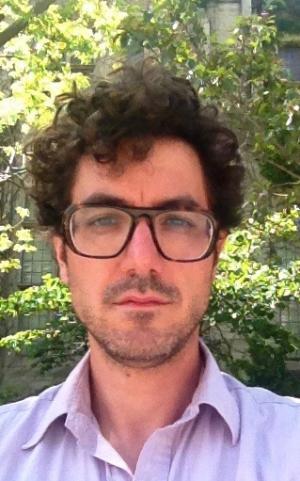
Massachusetts Institute of Technology, PhD '11
BIOGRAPHY
Michael Rossi is an historian of medicine and science in the United States from the nineteenth century to the present. His work focuses on the historical and cultural metaphysics of the body: how different people at different times understood questions of beauty, truth, falsehood, pain, pleasure, goodness, and reality vis-à-vis their corporeal selves and those of others.
His first book manuscript traces the origins of color science—the physiology, psychology, and physics of color—in the late-nineteenth-century United States to a series of questions about what modern America ought to be: about the scope of medical, scientific, and political authority over the sensing body; about the nature of aesthetic, physiological, and cultural development between individual and civilization; about the relationship between aesthetic harmony, physiological balance, and social order.
His second project looks at how linguists, anatomists, and speech pathologists moved, over the course of the twentieth century, from viewing language as a function of sound-producing organs (tongue, lips, palate, larynx, etc.) to searching for a notional “language organ” within the brains of all human beings. Such interpretative shifts in understanding human anatomy are neither an ancient phenomenon nor one limited to extreme medical specialization, but rather are ongoing issues, providing a window on the social, political, and philosophical understanding of modern bodies, medicine, and science.
Prior to Chicago, Michael was a postdoctoral fellow in the Groupe Histoire des sciences de l’homme at the Ecole Normale Superieur de Cachan in France. He received a PhD in the history and anthropology of science, technology, and society from MIT and an AB from Columbia University.
Recent Research / Recent Publications
-
Publishes The Republic of Color (University of Chicago, 2019)
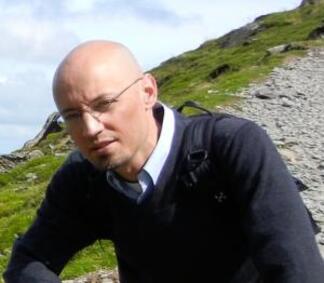
University of Chicago, PhD '05
BIOGRAPHY
My first book, Enlightenment's Frontier: the Scottish Highlands and the Origins of Environmentalism (Yale, 2013) investigates the environmental roots of the Scottish Enlightenment. What was the place of the natural world in Adam Smith's famous defense of free trade? This perspective recovers the forgotten networks of improvers and natural historians that sought to transform the soil, plants, and climate of Scotland in the eighteenth century. The Highlands offered a vast outdoor laboratory for rival liberal and conservative views of nature and society. But when the improvement schemes foundered toward the end of the century, northern Scotland instead became a crucible for anxieties about overpopulation, resource exhaustion, and the physical limits to economic growth. In this way, the rise and fall of the Enlightenment in the Highlands sheds new light on the origins of environmentalism.
My second book, Green Victorians: The Simple Life in John Ruskin's Lake District (Chicago, 2016), coauthored with Vicky Albritton, considers the problem of the Anthropocene from the perspective of a late Victorian utopian movement. Green Victorians tells the story of the first "post-carbon" society in Britain, a community in the English Lake District dedicated to Arts and Crafts industry and simple living. This experiment was galvanized by precocious anxieties about anthropogenic climate change, voiced by the eccentric polymath John Ruskin. He convinced his supporters to reject coal and steam in favor of renewable energy and labor-intensive handicraft production. By creating a new culture of sufficiency, Ruskin and his followers sought to demonstrate that a simple material life was still compatible with a great measure of cultural creativity and intellectual freedom. Green Victorians explores the radical and material experience of Ruskin's community without shying away from the darker side of the movement, including its technophobia and paternalism.
My current research deals with a set of closely related themes in environmental history, history of science, and political economy. The British Industrial Revolution saw the birth of the first fossil fuel economy. At the same time, geologists transformed the public understanding of the earth's interior and deep past. My new project sets out to show that these developments—fossil growth and fossil science—converged to produce a fundamental reorientation of politics and culture towards cheap energy and cornucopian growth.
My research has been funded by fellowships from the Institute of Historical Research in London, the Andrew W. Mellon Foundation, the Huntington Library in Los Angeles, the American Council for Learned Societies, and the Notre Dame Institute for Advanced Study.
Recent Research / Recent Publications
- Fredrik Albritton Jonsson and Carl Wennerlind, Scarcity: Economy and Nature in the Age of Capitalism, Harvard University Press, 2023.
- Coauthor with Vicky Albritton. Green Victorians: The Simple Life in John Ruskin's Lake District. Chicago: University of Chicago Press, 2016. Ruskin Society Book Prize 2016 (runner up).
- Enlightenment's Frontier: The Scottish Highlands and the Origins of Environmentalism. New Haven, CT: Yale University Press, 2013.
- Editor with John Brewer, Neil Fromer, and Frank Trentmann, Scarcity in the Modern World: History, Politics, Society and Sustainability 1800-2075, Bloomsbury Press: 2019
- “Ruskin in the Year of COVID 19,” Ruskin Birthday Reflections, Reilly Center, Notre Dame, February 8, 2021
- Contributor to Roundtable on Duncan Kelly, Politics and the Anthropocene for H-Diplo.
- “Natural History” in Old Ways New Roads, ed. Nigel Leask et al (Edinburgh: Birlinn 2021), museum catalogue for 2020 exhibition about Highland tour at the Hunterian Museum in Glasgow
- "The Coal Question Before Jevons." Historical Journal 62, no. 2 (June 2019).
- "Growth in the Anthropocene." In Scarcity in the Modern World: History, Politics, Society, and Sustainability, 1800–2075, edited by John Brewer, Neil Fromer, Fredrik Albritton Jonsson, and Frank Trentmann. London: Bloomsbury Press, 2019.
- “Roundtable: The Anthropocene in British History [with Chris Otter, Alison Bashford, John Brooke, and Jason Kelly]." Journal of British Studies 57, no. 3 (July 2018): 568–96.
- "Abundance and Scarcity in Geological Time 1784–1844." In Nature, Action, and the Future: Political Thought and the Environment, edited by Katrina Forester and Sophie Smith, 70–93. Cambridge: University of Cambridge Press, 2018.
- "Political Economy." In Historicism and the Human Sciences in Victorian Britain, edited by Mark Bevir, 154–85. Cambridge: Cambridge University Press, 2017.
- "Scottish Tobacco and Rhubarb: The Natural Order of Civil Cameralism in the Scottish Enlightenment." Eighteenth-Century Studies 49, no. 2 (Win. 2016): 129–47
- "Adam Smith and Enlightenment Studies." In Adam Smith: His Life, Thought, and Legacy, edited by Ryan Patrick Hanley, 443–60. Princeton, NJ: Princeton University Press, 2016.
- "Island, Nation, Planet: Malthus and the Enlightenment." In New Perspectives on Malthus, edited by Robert J. Mayhew, 128–54. Cambridge: Cambridge University Press, 2016.
- "Climate Change and the Retreat of the Atlantic: The Cameralist Context of Pehr Kalm's Voyage to North America 1748–51" William and Mary Quarterly 72, no. 1 (Jan. 2015).
- "The Origins of Cornucopianism: A Preliminary Genealogy." Critical Historical Studies 1, no. 1 (Spr. 2014).
- "Adam Smith in the Forest." In The Social Lives of the Forests, edited by Susanna B. Hecht, Kathleen D. Morrison, and Christine Padoch. Chicago: University of Chicago Press, 2013.
- "Natural History and Improvement: The Case of Tobacco." In Mercantilism Reimagined: Political Economy in Early Modern Britain and Its Empire, edited by Philip J. Stern and Carl Wennerlind. Oxford: Oxford University Press, 2013.
- "A History of the Species?" Review essay of Deep History: The Architecture of Past and Present, edited by Andrew Shyrock and Daniel Lord Smail, History and Theory 52, no. 3 (Oct. 2013).
- "The Industrial Revolution in the Anthropocene." Journal of Modern History 83, no. 3 (Sept. 2012).
- "Rival Ecologies of Global Commerce: Adam Smith and the Natural Historians." American Historical Review 115, no. 5 (Dec. 2010).
- "Prudence and Magnanimity: Roundtable on Ryan Hanley's Adam Smith and the Character of Virtue." The Art of Theory: Conversations in Political Philosophy (Nov. 2010).
- "Enlightened Hands: Managing Dexterity in British Medicine and Manufactures 1760–1800." In Body Parts: Critical Explorations in Corporeality, edited by Christopher Forth and Ivan Crozier. Lanham, MD: Lexington Books, 2005.
- "The Physiology of Hypochondria in Eighteenth-Century Britain." In Cultures of the Abdomen: Dietetics, Digestion, and Fat in the Modern World, edited by Christopher E. Forth and Ana Cardin-Coyne. Palgrave Macmillan, 2005.
- Co-authors "Reducing the Carbon Footprint of Academic Travel," Inside Higher Ed, Apr. 18, 2019
- Launches planetary history research project with Dipesh Chakrabarty
- Participates in Q&A on how to teach the Anthropocene, EuropeNow, with syllabus
- Discusses Amitav Ghosh’s recent book, The Great Derangement: Climate Change and the Unthinkable, in an article in the Guardian.
- Coauthors, with Vicky Albritton, Green Victorians: the Simple Life in John Ruskin's Lake District (Chicago, 2016). Ruskin Society Book Prize 2016 (runner up).
- Coorganizes "Climate Change: Disciplinary Challenges to the Humanities and Social Sciences" at the Neubauer Collegium
- Delivers the inaugural T. C. Smout Lecture in Scottish History on the "Enlightenment's Frontier: The Scottish Highlands and the Origins of Environmentalism" [audiocast, 55 minutes
- Talks at the Social Life of Forests Conference on "Invisible Forests: Natural Knowledge in the Making of Classical Economics" [video, 27 minutes]
- Co-author with Rachael Osborn, Mark Fiege and Will Wright, Amicus brief of environmental historians, Juliana v. United States, February 22, 2019.
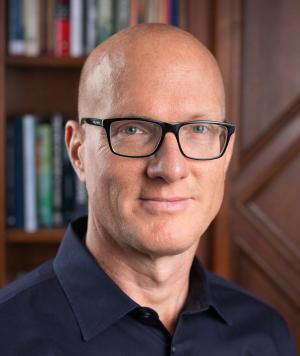
Brown University, Ph'D 02
Office Hours:
Spring Quarter 2025
https://calendly.com/jtsparrow/office-hours
BIOGRAPHY
I am an historian of modern US politics broadly construed, with special interests in the mutual constitution of social categories, democratic publics, and state formation.
My first book, Warfare State, is a history of the social politics of the national state as its foundations shifted from welfare to warfare during World War II. Its central concern is to examine the ways in which different groups of citizens encountered the burgeoning warfare state and in the process accepted, rejected, or otherwise contested the legitimacy of expanding federal authority in everyday life, thereby shaping the horizons of political possibility for decades.
I am currently completing a sequel to Warfare State tentatively titled Sovereign Discipline: The American Extraterritorial State in the Atomic Age. This book examines the mass politics of extraterritorial sovereignty, and the crisis of legitimacy it engendered, from V-E Day to the Cuban Missile Crisis. My third book project is also nearing completion. It is an intellectual history titled New Leviathan: Rethinking Sovereignty and Political Agency after Total War.
Much of this recent work is informed by a long-term collaborative research project on the problem of the democratic state, which has benefitted from two Neubauer Collegium project grants for which I am codirector ("The State as History and Theory" and "The Problem of the Democratic State in US History"), and resulted in the edited collection Boundaries of the State in US History as well as two special issues of the Tocqueville Review.
My teaching interests include both graduate and undergraduate courses on the history of US politics, diplomacy, and war; social engineering; social movements; citizenship; America in the world; the American state; and a set of undergraduate research seminars on the history of the New Deal, the early Cold War, and digital history. I am also committed to teaching in Chicago's distinctive Core Curriculum. It is one of the oldest general education curricula in the United States, engaging foundational works and questions in the humanistic social sciences for decades since the 1930s.
Recent Research / Recent Publications
Warfare State: World War II Americans and the Age of Big Government. New York: Oxford University Press, 2011.
- Honorable mention, 2012 Frederick Jackson Turner Award, Organization of American Historians.
- Review by Walter Russell Mead in Foreign Affairs (March/April 2012).
-
Boundaries of the State in US History, edited by James T. Sparrow, William J. Novak, and Stephen W. Sawyer . Chicago: University of Chicago Press, 2015.
-
"Beyond Stateless Democracy," edited by William J. Novak, Stephen W. Sawyer, and James T. Sparrow, special issue, Tocqueville Review 36, no. 1 (2015).
-
"The History of the French and American States," edited by Stephen W. Sawyer, William J. Novak, and James T. Sparrow, special issue, Tocqueville Review 33, no. 2 (2012).
-
"Democratic States of Un-Exception: Towards a New Genealogy of the American Political," coauthored with William J. Novak and Stephen W. Sawyer. In Many Hands of the State, edited by Kimberly Morgan and Ann Orloff. Cambridge: Cambridge University Press, in press.
-
"Rumors of Empire: Tracking the Image of Britain at the Dawn of the American Century." In Boundaries of the State in US History, edited by James T. Sparrow, William J. Novak, and Stephen W. Sawyer . Chicago: University of Chicago Press, 2015.
-
"Introduction," coauthored with William J. Novak and Stephen W. Sawyer. In Boundaries of the State in US History, edited by James T. Sparrow, William J. Novak, and Stephen W. Sawyer. Chicago: University of Chicago Press, 2015.
-
"Morgenthau's Dilemma: Rethinking the Democratic Leviathan in the Atomic Age." In "Beyond Stateless Democracy, edited by William J. Novak, Stephen W. Sawyer, and James T. Sparrow, special issue, Tocqueville Review 36, no. 1 (2015).
-
"Beyond Stateless Democracy," coauthored with William J. Novak and Stephen W. Sawyer, In "Beyond Stateless Democracy, special issue, Tocqueville Review 36, no. 1 (2015).
-
"Behind the Atomic Curtain: School Desegregation and Territoriality in the Early Cold War." In "The History of the French and American States, edited by Stephen W. Sawyer, William J. Novak, and James T. Sparrow, special edition, Tocqueville Review 33, no. 2 (2012): 115–139.
-
"Toward a History of the Democratic State," coauthored with William J. Novak and Stephen W. Sawyer. In "The History of the French and American States, special edition, Tocqueville Review 33, no. 2 (2012): 7–18.
-
"Freedom to Want: The Federal Government and Politicized Consumption in World War II." In Fog of War: The Second World War and the Civil Rights Movement, edited by Kevin M. Kruse and Stephen Tuck. New York: Oxford University Press, 2012.
-
"A Nation in Motion: Norfolk, the Pentagon, and the Nationalization of the Metropolitan South, 1941–1953." In The Myth of Southern Exceptionalism, edited by Matthew D. Lassiter and Joseph Crespino. New York: Oxford University Press, 2010.
-
"'Buying Our Boys Back': The Mass Foundations of Fiscal Citizenship in World War II." Journal of Policy History 20, no. 2 (2008): 263–86.
-
"Hot War, Cold War: The Structures of Sociological Action, 1940–1955," coauthored with Andrew Abbott. In Sociology in America: The American Sociological Association Centennial History, edited by Craig Calhoun. Chicago: University of Chicago Press, 2007.
-
Awarded 2023 Quantrell Award for excellence in undergraduate teaching
-
Named an OAH Distinguished Lecturer
-
Co-organizes Major Project on "State as History and Theory" at the Neubauer Collegium